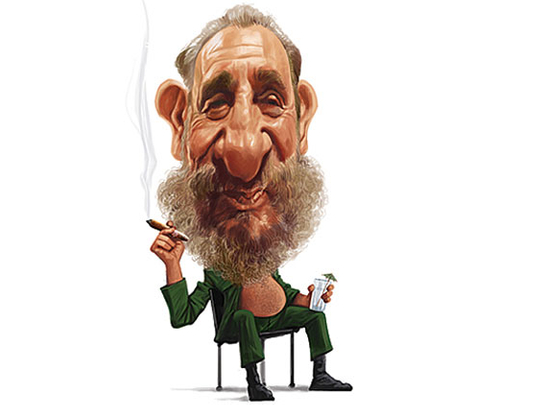
The hot sun beats down relentlessly on the largely Canadian tourists taking in the vast potholed asphalt expanse of Place de la Revolucion in central Havana, a giant iron-framed portrait of Che Guevara looking down on the capitalist visitors supplying hard currency to the Cuban economy. This is the square where for the five decades of his presidency, Fidel Castro ranted for hours against the American leadership across the Florida Strait, lectured visiting Soviet dignitaries on the virtues of Caribbean communist theory, and lectured his masses on the necessity to fight imperialism and its economic blockade trying to suck the very lifeblood of the Cuban people. Around the city and on walls across this communist outpost are painted slogans such as ‘Socialismo o muerte’ (socialism or death).
Castro is no longer in power. His brother Raul is — and little has changed.
Yes, there are minor market reforms and Cubans can now have their own businesses, selling tacky tourist souvenirs to those Canadians who flock south on all-inclusive package holidays to sip rums and cola — Coca Cola is still banned from the island because of its US imperialist roots. And cellphones are now allowed — you can talk on one when you’re driving your fin-tailed 1956 Chevrolet Impala held together by string and wire coat hangers.
Fidel turned 87 earlier this week — quite a feat for a revolutionary who looked to be at death’s door for the past seven years. But as countless administrations in Washington have found out, much to their chagrin, it’s impossible to write off Castro, never mind killing him with exploding cigars or some other twisted assassination means dreamt up by the white-coated scientists of the Central Intelligence Agency.
Who ever said smoking was bad for you? After a lifetime of puffing on his Havanos, Castro is largely as fit as a fiddle and still writing and lecturing on his personal experiment with Marxist Leninism.
“I was far from imagining that my life would be prolonged seven more years,” he commented earlier this week, contemplating his longevity and mortality.
Castro stepped aside provisionally in 2006 and retired permanently in 2008. He has rarely appeared in public since, though photographs and videos of him are released occasionally through official media.
In an essay, he also reflected on topics such as the death in March of his friend and ally Hugo Chavez, the former Venezuelan president, as well as the wonders of science.
“The sciences should teach us above all to be humble, given our congenital self-sufficiency,” he said. “Thus would we be better prepared to confront and even enjoy the rare privilege of existence.”
Castro also touched on key Cold War moments such as the Cuban missile crisis and the failed Bay of Pigs invasion, and said the Soviet premier Yuri Andropov told him in the early 1980s that Moscow would not step in if Cuba were to be invaded.
“He said that if we were attacked by the United States, we should fight alone,” Castro wrote. “We asked if they could supply us with free arms as [they had up until that time]. He said, ‘Yes’. We told him then: ‘Don’t worry, send us the weapons and we will take care of the invaders ourselves’.
“Only a few of us knew about this because it would have been very dangerous for the enemy to have that kind of information,” Castro said.
He added that former North Korean leader Kim Il-sung also aided Havana by providing 100,000 Kalashnikov assault rifles “without charging a cent”.
Castro’s birthday celebrations were largely in private, but there’s little doubt that he didn’t receive a birthday card or greeting from the White House. For the record, there is a cheque that comes every month from Washington, payment for the lease the US has on its military base in Guantanamo Bay. When he was president, Castro kept those cheques in a drawer in his office; he liked to show them in disgust to visiting dignitaries. Only once has a cheque been cashed — done so in error, and no doubt the poor Communist Party apparatchik who made the error paid for it dearly in the dank cells and prisons in which the rest of Castro’s enemies — private and public — have been placed.
That blazing sun over Place de la Revolucion has yet to set over his proletarian paradise in the Caribbean. Like those slogans say: Socialismo o muerte.










